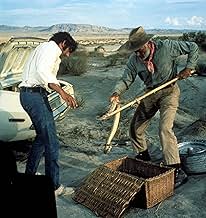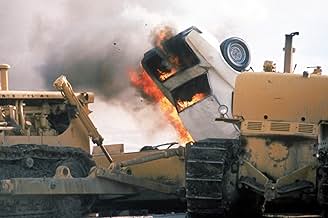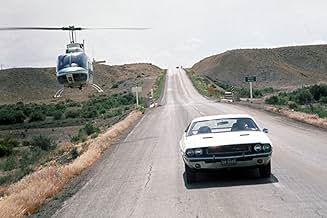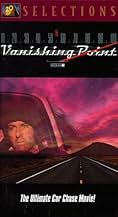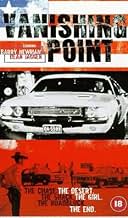IMDb-BEWERTUNG
7,2/10
31.848
IHRE BEWERTUNG
In den 1970er Jahren liefert der Autozulieferer Kowalski Hot Rods in Rekordzeit, gerät aber immer wieder in Schwierigkeiten mit den Autobahnpolizei.In den 1970er Jahren liefert der Autozulieferer Kowalski Hot Rods in Rekordzeit, gerät aber immer wieder in Schwierigkeiten mit den Autobahnpolizei.In den 1970er Jahren liefert der Autozulieferer Kowalski Hot Rods in Rekordzeit, gerät aber immer wieder in Schwierigkeiten mit den Autobahnpolizei.
- Regie
- Drehbuch
- Hauptbesetzung
- Auszeichnungen
- 1 Nominierung insgesamt
Charlotte Rampling
- Hitch-Hiker
- (Gelöschte Szenen)
Robert Donner
- Deputy Collins
- (as Bob Donner)
Empfohlene Bewertungen
Vanishing Point is a difficult film to assess in many ways. As a movie, it is quite flawed. The plot is obvious but ultimately quite shallow - centering around Kowalski trying to deliver a car across the country in record time. Kowalski's back story is hinted at, which makes the film a bit more interesting, but his back story takes up only a few minutes of the film.
The characters and performances are often vacuous, failing to leave an impression. Barry Newman is the chief culprit, turning in a most colourless, emotionless performance where he personally offers little insight into his character. The exception is Cleavon Little as the hyperactive DJ Super-Soul; his interplay with Newman is novel, some of his dialogue is memorable (indeed, his rambling about Kowalski and the 'police Nazis' was quoted by Axl Rose of Guns N' Roses twenty years later) and his input gives the film some badly needed impetus.
Luckily though, Vanishing Point works better on other levels. For instance, it has that early 1970's style that makes the film more compelling than it should be. Newman is chiefly responsible for this; he is certainly emotionless, but that allows him to develop an air of 'cool' that suits the film. The white Dodge Challenger is a very nice touch.
The early 70's style also allows it to work as a period piece; Kowalski encounters counter-culture hippies, religious fanatics in the desert and the police. The fractious state of race relations between blacks and whites at that time is also highlighted. On the downside, it does substantially date the film. It's a cult classic for a reason; as the failed 1997 remake demonstrated, a movie like Vanishing Point would not work nearly as well in another era.
It also works reasonably well as a straight driving film. The film is punctuated with enough car crashes and chases to move the film forward.
However, the film's real saving grace is in its many allegories. The largely empty plot does ironically enable this, because you can read whatever you want into the film. I therefore understand why the plot is so empty, because the many allegories punctuated within the film make it intriguing to watch. For instance, why did Kowalski's face shine towards the end? Why were there so many STOP signs? Was Super-Soul a spiritual guide to Kowalski? You can also have fun inventing allegories that weren't even intended - why was the Dodge Challenger white, for example?
Ultimately, Vanishing Point is not the easiest film to assess. In conventional terms, I would not rank the film particularly highly because the plot, characters, acting and dialogue are often unimpressive. As such, the casual movie viewer may not particularly identify with it. However, Vanishing Point is not a particularly conventional film; like most good films it moves itself forward well, but it is the film's style and allegorical nature that largely keeps the interest and pushes the film above the ruck of many other driving movies. I also admit that the film could not have been as effective as an allegory if the plot wasn't so insubstantial. With this in mind, I have decided to give it:
3.5/5 stars
The characters and performances are often vacuous, failing to leave an impression. Barry Newman is the chief culprit, turning in a most colourless, emotionless performance where he personally offers little insight into his character. The exception is Cleavon Little as the hyperactive DJ Super-Soul; his interplay with Newman is novel, some of his dialogue is memorable (indeed, his rambling about Kowalski and the 'police Nazis' was quoted by Axl Rose of Guns N' Roses twenty years later) and his input gives the film some badly needed impetus.
Luckily though, Vanishing Point works better on other levels. For instance, it has that early 1970's style that makes the film more compelling than it should be. Newman is chiefly responsible for this; he is certainly emotionless, but that allows him to develop an air of 'cool' that suits the film. The white Dodge Challenger is a very nice touch.
The early 70's style also allows it to work as a period piece; Kowalski encounters counter-culture hippies, religious fanatics in the desert and the police. The fractious state of race relations between blacks and whites at that time is also highlighted. On the downside, it does substantially date the film. It's a cult classic for a reason; as the failed 1997 remake demonstrated, a movie like Vanishing Point would not work nearly as well in another era.
It also works reasonably well as a straight driving film. The film is punctuated with enough car crashes and chases to move the film forward.
However, the film's real saving grace is in its many allegories. The largely empty plot does ironically enable this, because you can read whatever you want into the film. I therefore understand why the plot is so empty, because the many allegories punctuated within the film make it intriguing to watch. For instance, why did Kowalski's face shine towards the end? Why were there so many STOP signs? Was Super-Soul a spiritual guide to Kowalski? You can also have fun inventing allegories that weren't even intended - why was the Dodge Challenger white, for example?
Ultimately, Vanishing Point is not the easiest film to assess. In conventional terms, I would not rank the film particularly highly because the plot, characters, acting and dialogue are often unimpressive. As such, the casual movie viewer may not particularly identify with it. However, Vanishing Point is not a particularly conventional film; like most good films it moves itself forward well, but it is the film's style and allegorical nature that largely keeps the interest and pushes the film above the ruck of many other driving movies. I also admit that the film could not have been as effective as an allegory if the plot wasn't so insubstantial. With this in mind, I have decided to give it:
3.5/5 stars
One thing I realised about carfilms, or whatever you might call them, is that a certain degree of monotony is always required (check out the wonderful Two Lane Blacktop too see what I mean). If you waste too much time with backgrounds, character development, story etc the really important stuff starts lacking (the car as an instrument of freedom, the road, the desert...). In this way Vanishing Point is the perfect carmovie: it's about the most monotonous, yet beautiful things i've ever seen! It's about:
1. The car
2. The road
3. The desert
4. The music
And nothing else! Some vague attempts are made to make a character out of Kowalski, but fortunely they're small in numbers. The car is the true main character of the film.
I recommend this film with all my heart.
1. The car
2. The road
3. The desert
4. The music
And nothing else! Some vague attempts are made to make a character out of Kowalski, but fortunely they're small in numbers. The car is the true main character of the film.
I recommend this film with all my heart.
Barry Newman is "Kowalski", an enigmatic figure who has tried everything in his life from stock car racing to the military, and failed at every one of his endeavors. Working as an auto delivery man, he gets an order to transport a 1970 Dodge Challenger R/T to San Francisco, and makes a bet with a few friends that it can be done in an impossibly short time. After loading up on "ups" and throttling the car westward, he is soon pursued vigorously by the police and embraced by the public as something of a hero. During a time when national speed limits were all controversy, this film provides a compelling argument against them: A fast car in the hands of a capable driver is not dangerous. Even the police, so caught up in their own system, don't realize that they are the only ones causing accidents and endangering the public while blindly trying to keep up with and capture Kowalski.
While the film sounds at first to be a simple action film, it's really much more than that. Kowalksi's past is revealed little by little through flashbacks, making the film something of a character study. Kowalski's trip becomes a road trip of existentialism as he runs across various strange characters: Solitary hippies, gay bandits, a boogie-woogie snake handling Christian cult, and the blind soul station DJ (brilliantly played by Cleavon Little) who is attempting to guide him on his journey from within the car's radio.
Topping it off is a great soundtrack, breathtaking cinematography and direction, and automotive action that has seen no equal. This film manages to be both compelling and exciting. Just watch it already.
10/10
While the film sounds at first to be a simple action film, it's really much more than that. Kowalksi's past is revealed little by little through flashbacks, making the film something of a character study. Kowalski's trip becomes a road trip of existentialism as he runs across various strange characters: Solitary hippies, gay bandits, a boogie-woogie snake handling Christian cult, and the blind soul station DJ (brilliantly played by Cleavon Little) who is attempting to guide him on his journey from within the car's radio.
Topping it off is a great soundtrack, breathtaking cinematography and direction, and automotive action that has seen no equal. This film manages to be both compelling and exciting. Just watch it already.
10/10
This is the essential 1970s anti-hero movie. It is not supposed to make sense and I have often wondered if it were not meant to be someone's psychedelic dream. Nudity when nudity would not seem to fit; bad cops; beaten people out of sync with plot line. Sounds like a trip. The cast is excellent and this is one of Cleavon Little's last main roles as well as the last main role for the early love interest. John Amos is so underplayed he is almost unrecognizable, I'd love to see his commentary on the movie. And one guy is so ripping off James Dean (though as a racist) that it is unintentionally funny. I'd recommend it as an addition to any American tape library. A true cult classic.
10AdamKey
Richard Sarafian's 1971 film "Vanishing Point" is, for starters, a fascinating study of those persons anthropologists sometimes term "marginal men"--individuals caught between two powerful and competing cultures, sharing some important aspects of both but not a true part of either, and, as such, remain tragically confined to an often-painful existential loneliness. Inhabiting a sort of twilight zone between "here" and "there," a sort of peculiar purgatory, these restless specters cannot find any peace or place, so they instead instinctively press madly on to some obscure and unknown destination, the relentless journey itself being the only reason and justification.
Disc jockey Super Soul (Cleavon Little) and delivery driver Kowalski (Barry Newman) are two of these specters, marginal but decent, intelligent men who can't or won't live in burgeoning competing cultures which in reality have offered them very little of worth or substance, despite their own personal sacrifices. Kowalski himself had tried to "fit in" with the Establishment as a soldier and police officer and later, attempted to do the same with the blossoming 1960s counterculture, but soon disappointingly found that they both were ridden with their own various forms of dishonesty and insincerity. Personal honor, self-reliance and genuine respect--Kowalski's stock in trade--were tragically valued very little by either, despite each one's shrill and haughty claims to the contrary.
Moreover, it's no accident Newman's character has a Polish surname; the Poles throughout their history have created a very rich and unique Slavic culture largely based upon just such a "marginality"--being geographically jammed between powerful historic enemies, Germany and Russia, and never being able to fully identify with either one, at often great cost to themselves. It's also no accident Little's character is blind and black, the only one of his kind in a small, all-Caucasian western desert town--his sightlessness enhancing his persuasiveness and his ability to read Kowalski's mind, the radio microphone his voice, his race being the focus of long simmering and later suddenly explosive disdain--all of the characteristics of a far-seeing prophet unjustly (but typically) dishonored in his own land.
The desert environment also plays a key role in cementing the personal relationship between and respective fates of these two men--to paraphrase British novelist J.G. Ballard, prophets throughout our history have emerged from deserts of some sort since deserts have, in a sense, exhausted their own futures (like Kowalski himself had already done) and thus are free of the concepts of time and existence as we have conventionally known them (as Super Soul instinctively knew, thus creating his own psychic link to the doomed driver.) Everything is somehow possible, and yet, somehow nothing is.
Finally, VP is also a "fin de siecle" story, a unique requiem for a quickly dying age- a now all-but-disappeared one of truly open roads, endless speed for the joy of speed's sake, of big, solid no-nonsense muscle cars, of taking radical chances, of living on the edge in a colorful world of endless possibility, seasoned with a large number and wide variety of all sorts of unusual characters, all of which had long made the USA a wonderful place--and sadly is no longer, having been supplanted by today's swarms of sadistic, military-weaponed cop-thugs, obsessive and intrusive safety freaks, soulless toll plazas, smug yuppie SUV drivers, tedious carbon-copy latte towns, and a childish craving for perfect, high-fuel-efficiency safety and security.
The just-issued DVD contains both the US and UK releases of the film; the UK release, I believe, is a much more satisfying film, as it has the original scenes deleted from the US version. As an aside, Super Soul's radio station call letters, KOW, are in fact the ones for a country & western station in San Diego.
Disc jockey Super Soul (Cleavon Little) and delivery driver Kowalski (Barry Newman) are two of these specters, marginal but decent, intelligent men who can't or won't live in burgeoning competing cultures which in reality have offered them very little of worth or substance, despite their own personal sacrifices. Kowalski himself had tried to "fit in" with the Establishment as a soldier and police officer and later, attempted to do the same with the blossoming 1960s counterculture, but soon disappointingly found that they both were ridden with their own various forms of dishonesty and insincerity. Personal honor, self-reliance and genuine respect--Kowalski's stock in trade--were tragically valued very little by either, despite each one's shrill and haughty claims to the contrary.
Moreover, it's no accident Newman's character has a Polish surname; the Poles throughout their history have created a very rich and unique Slavic culture largely based upon just such a "marginality"--being geographically jammed between powerful historic enemies, Germany and Russia, and never being able to fully identify with either one, at often great cost to themselves. It's also no accident Little's character is blind and black, the only one of his kind in a small, all-Caucasian western desert town--his sightlessness enhancing his persuasiveness and his ability to read Kowalski's mind, the radio microphone his voice, his race being the focus of long simmering and later suddenly explosive disdain--all of the characteristics of a far-seeing prophet unjustly (but typically) dishonored in his own land.
The desert environment also plays a key role in cementing the personal relationship between and respective fates of these two men--to paraphrase British novelist J.G. Ballard, prophets throughout our history have emerged from deserts of some sort since deserts have, in a sense, exhausted their own futures (like Kowalski himself had already done) and thus are free of the concepts of time and existence as we have conventionally known them (as Super Soul instinctively knew, thus creating his own psychic link to the doomed driver.) Everything is somehow possible, and yet, somehow nothing is.
Finally, VP is also a "fin de siecle" story, a unique requiem for a quickly dying age- a now all-but-disappeared one of truly open roads, endless speed for the joy of speed's sake, of big, solid no-nonsense muscle cars, of taking radical chances, of living on the edge in a colorful world of endless possibility, seasoned with a large number and wide variety of all sorts of unusual characters, all of which had long made the USA a wonderful place--and sadly is no longer, having been supplanted by today's swarms of sadistic, military-weaponed cop-thugs, obsessive and intrusive safety freaks, soulless toll plazas, smug yuppie SUV drivers, tedious carbon-copy latte towns, and a childish craving for perfect, high-fuel-efficiency safety and security.
The just-issued DVD contains both the US and UK releases of the film; the UK release, I believe, is a much more satisfying film, as it has the original scenes deleted from the US version. As an aside, Super Soul's radio station call letters, KOW, are in fact the ones for a country & western station in San Diego.
Wusstest du schon
- WissenswertesIn an interview, actor Paul Koslo spoke about legendary stunt driver Cary Loftin; "One night coming home from location, Cary was driving one of the Challengers back to the hotel, and he passed some New Mexico state troopers going 145 miles an hour! [laughs] He had four or five cop cars behind him with their lights on, but they couldn't catch up because they could only go about 125! So he drove into this little town and started to shut the car down. He pulled into a gas station, and I swear to God, he did a 360 in between the pumps and put the rear of the car - the gas tank - right in front of the super pump! He got out of the car like nothing happened, and the troopers busted his ass right there! [laughs] Oh, you should've seen those cops! They were fuming! They took him in, and the producer had to explain to them that Cary had actually been testing the car - that he did a lot of these spinouts because he'd been having trouble with the car! [laughs] I mean, you do have to test the cars, but you don't do it while you're driving home!"
- PatzerThe 19-inch racks in Super Soul's radio station with large tape reels (in one scene seen fast moving) are not audio equipment. These tape drives were used in computer systems in the 1970s to store data on tape.
- Zitate
Super Soul: This radio station was named Kowalski, in honour of the last American hero to whom speed means freedom of the soul. The question is not when's he gonna stop, but who is gonna stop him.
- Crazy CreditsThe Fox logo is shown without the fanfare making it one of the first times this has happened.
- Alternative VersionenWhen first released in Brazil, the movie had some scenes cut, reducing the running time to 99 minutes.
- SoundtracksYou Got to Believe
Composed by Delaney Bramlett
Sung by Delaney & Bonnie & Friends
(Courtesy of Atlantic Records)
Top-Auswahl
Melde dich zum Bewerten an und greife auf die Watchlist für personalisierte Empfehlungen zu.
Details
- Erscheinungsdatum
- Herkunftsland
- Sprache
- Auch bekannt als
- Fluchtpunkt San Francisco
- Drehorte
- Goldfield Hotel, Goldfield, Nevada, USA(KOW radio station)
- Produktionsfirma
- Weitere beteiligte Unternehmen bei IMDbPro anzeigen
Box Office
- Budget
- 1.585.000 $ (geschätzt)
- Bruttoertrag in den USA und Kanada
- 12.442.673 $
- Weltweiter Bruttoertrag
- 12.443.722 $
- Laufzeit
- 1 Std. 39 Min.(99 min)
- Farbe
- Seitenverhältnis
- 1.85 : 1
Zu dieser Seite beitragen
Bearbeitung vorschlagen oder fehlenden Inhalt hinzufügen


